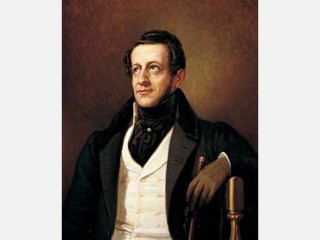
Angel De Saavedra biography
Date of birth : 1791-03-10
Date of death : 1865-06-22
Birthplace : Cordova, Spain
Nationality : Spanish
Category : Famous Figures
Last modified : 2010-12-07
Credited as : Poet and dramatist, statesman, El Moro Exposito
The Spanish poet, dramatist, and statesman Angel de Saavedra, Duque de Rivas, is best known for his drama Don Ãlvaro, or the Force of Destiny, which marked the triumph of romanticism in Spain.
Angel de Saavedra, later the Duque de Rivas, was born on March 10, 1791, in Cordova, the second son of a family of grandees. In 1800 the family moved to Madrid, where Saavedra studied at the Seminario de Nobles. In 1808, at the outbreak of the War of Independence against Napoleon, he joined the Castilian army. Badly wounded in 1809, he went to Cadiz, where he met Quintana and Martinez de la Rosa, two major literary figures. Between 1814 and 1820 he wrote drama and poetry in the classical manner, publishing various poems with the title Poesias in 1814.
By 1823 Saavedra had joined the liberals against the despotic rule of Ferdinand VII. He became a deputy and secretary of the Cortes and was among those who imprisoned the King at Cadiz. When Ferdinand regained power, Saavedra was condemned to death but escaped, emigrating with other Spanish intellectuals to London in 1823. For the next 10 years he lived abroad in England, Italy, Malta, and France. In Malta in 1825 he met John Hookham Frere, a noted English Hispanist who introduced him to the British romantics and urged him to search for poetic themes in Spanish history. In 1828 Saavedra wrote his poem El faro de Maltaand in 1829 began writing the first successful Spanish leyenda, El moro exposito, published in 1834. It is a long epic poem in 12 cantos that reworks the medieval story of the Siete Infantes de Lara and their Moorish half brother Mudarra. In keeping with the romantic spirit, Saavedra changed Mudarra into an exotic hero and sought to recreate the atmosphere of the days of chivalry.
In 1830 Saavedra witnessed in Paris the premiere of Victor Hugo's Hernani, which formally established romanticism in France. Saavedra was back in Spain when amnesty was granted in 1834, the year that his elder brother died without issue. Saavedra inherited the family fortune and title by which he is generally known. He adopted more conservative political views and in 1835 became minister of the interior.
The performance of Rivas's play Don Ãlvaro, o lilvaro, or the Force of Destiny) in 1835 signaled the advent of romanticism in Spain. Don Ãlvaro is a typically romantic hero, and the play is charged with violent action and melodrama. Yet Rivas balanced these romantic elements with expertly designed stage settings and scenes of fuerza del sino (Don A local color in which minor characters enact realistic, often comic, situations.
In 1837 Rivas was exiled again, this time for being a conservative. He returned in 1838 and in 1841 published Los romances historicos, poems inspired by Spanish ballad literature and ancient chronicles. During 1844-1860 Rivas served as ambassador in Naples, Paris, and Florence, and in Spain he was elected president of the Cortes and Consejo de Estado. After 1860 he withdrew from politics but continued as president of the Spanish Academy until his death on June 22, 1865, in Madrid.
The best book on Rivas's life and work is Edgar Allison Peers, Rivas and Romanticism in Spain (1923). Rivas is discussed in two general background works: Gerald Brenan, The Literature of the Spanish People (1951; 2d ed. 1953), and Richard E. Chandler and Kessel Schwartz, A New History of Spanish Literature (1961).
Lovett, Gabriel H., The Duke of Rivas, Boston: Twayne, 1977.
















